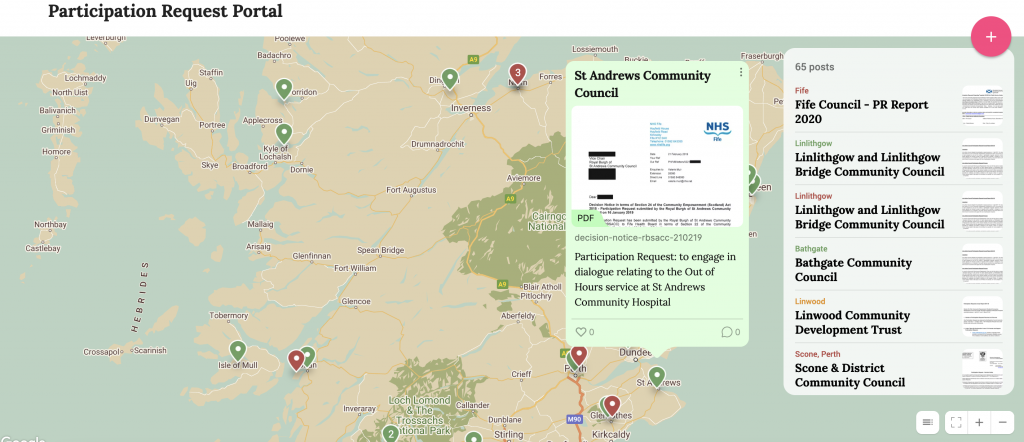By Dr. Angela Anderson – Depute Chair, Elie and Earlsferry Community Council, Penelope Fraser – Depute Chair, Royal Burgh of St Andrews Community Council, and Peter Lomas – Balmullo Community Council

On 6 November 2018 a PR was submitted by St Andrews Royal Burgh Council to the Fife Health and Social Care Partnership. Its purpose was to challenge the decision already taken by the Partnership to temporarily, then permanently close the Out-of-Hours GP-led service and Minor Injuries Unit at St Andrews Community Hospital; to seek support for alternative approaches that would improve outcomes; to start a dialogue with the Partnership about the future design of the services; to contribute to decision-making by ensuring the voices of the professionals who deliver the service and the service-users would be heard in policy and service development; and to participate in the design, delivery, monitoring and review of service provision.
The effect of our PR was to enable the Out-of-Hours service to be re-instated at the Community Hospital, albeit with some reduction in the operating hours. Looking back on the process, we realise that we had all been in uncharted waters. We had come upon the process by chance when some members of our informal campaigning group, based in St Andrews, attended a meeting set up by Fife Council to advise on work they were undertaking related to PRs. The members of our group who chose to take the PR process forward would definitely have benefited from a Toolbox like that created by the Social Studios group from the Innovation School at Glasgow School of Art, working in partnership with community groups from around Scotland.
Would we have done things differently if the Toolbox had been available? The answer to that has to be a definite ‘yes’. Through the Learning and Sharing tools and the PR Portal, we would have searched for other groups within Scotland who had previous experience of PRs and sought their advice. The PR Portal would have helped us gain an understanding of the scope, scale and focus of PRs. Information would have been available not only on previously submitted PRs, but also on the PSA’s decision notices and final reports.
The PR Toolbox also contains tools for Building Collaboration, which will enable CPBs in partnership with PSAs to initiate, plan, implement and evaluate projects. The tools will support innovation, the sharing of ideas, the identification of speed bumps and accelerators. They will also enable the identification of challenges and support the brainstorming of possible solutions. Central to all of this is the empowerment of the active community groups in their decision-making vis-à-vis the PSAs being approached.
In a democracy, legal institutional channels will always be present to allow organised community groups to petition PSAs for help or strategic change. The authorities themselves may adopt a default position of reserve towards PRs or have no designated members of staff with expertise or responsibility for handling these approaches (we suspect that the latter is the case in most regions of Scotland). What CPBs need from the outset, therefore, is a focus on specific, well-defined purposes. Here we found the Social Studios PR Toolbox to be especially useful with its range of imaginative and concrete modelling tools.
Informal community groups may also lack specialised expertise in the matter they are seeking to resolve, or the personnel and stamina to pursue their objective through the – perhaps lengthy and complex – series of procedures likely to be adopted by the receiving authority. Again, the flexibility and variety of the Social Studios tools will lend encouragement and resilience to petitioners’ efforts, and indeed help to make their whole involvement in the PR process enjoyable.
In the case of the previous PR launched by the St Andrews group, the Co-operate to Innovate Tool would have made it possible to obtain a full and proper discussion around the alternative redesign methodology for the Out-of-Hours service which we proposed. It would have enabled us to influence the choice of attendees at the redesign workshop and the topics for discussion – in particular to involve front-line NHS staff with the expertise and insight to make a positive difference and patient representatives with lived experience of the service.
We would, in addition, have used the Mission Control tool to formally flag up and share our aims with Fife Health Board; and we’d have considered using the PR Journey board game to explore with them possible routes to service improvements, in advance of any service redesign workshop. This more collaborative and interactive approach would have had considerable advantages over the written dialogue which took place. It would, finally, have enabled our community group to maintain influence over the developing PR process, monitor and review the outcome and get agreement on follow-up meetings with the Board – which in the event failed to materialise. With the range of tools available, community groups will be able to match the tools to their own particular circumstances and needs. In addition, the Toolbox contents will be refined over time to reflect feedback from community groups who have used them.
